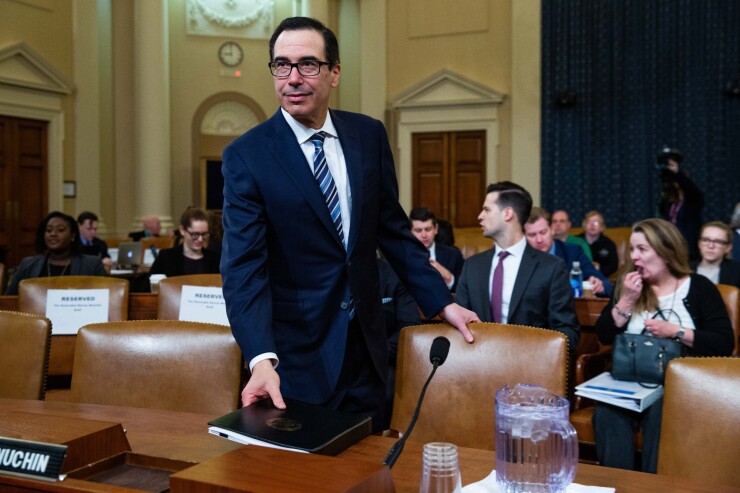The Treasury and the IRS are lowering the withholding underpayment threshold to 80% to give more taxpayers relief from tax penalties if they didn’t withhold enough taxes from their paychecks last year in the wake of 2018 tax overhaul.
The change applies to taxpayers whose total withholding and estimated tax payments for 2018 are equal to or greater than 80% of their taxes owed. The usual threshold for avoiding a tax penalty is 90%, but earlier this year the Treasury agreed to reduce the threshold to 85%. The Treasury and the IRS came under pressure from lawmakers to either waive the tax penalty for underwithholding entirely this year or lower it to 80%.
“I appreciate the bipartisan interest from members of Congress on this issue and agree that further relief should be provided to taxpayers,” said Treasury Secretary Steven Mnuchin in a statement. “Treasury is exempting even more taxpayers from the usual underpayment penalties in an effort to help those who attempted in good faith to meet their withholding obligations.”

Last year, the Treasury and the IRS urged taxpayers to use an
The IRS said it would waive the estimated tax penalty for any taxpayer who paid at least 80% of their total tax liability in 2018 via federal income tax withholding, quarterly estimated tax payments or a combination of the two. The revised waiver computation will be integrated into commercially available tax software and reflected in an upcoming revision of the instructions for
-
These property tax deferral programs are available to older homeowners who want to postpone real estate taxes provided they remain living in their home.
August 28 -
Homeowners from both parties worry that rising property taxes could force them to sell.
November 14 -
The holidays are fast approaching, which means it is time to start doing some year-end tax planning.
December 3
In
Lawmakers praised the extra relief. Rep. Judy Chu, D-Calif., pointed out that she had received a commitment from Mnuchin to respond to her request for this relief during a House Ways and Means Committee hearing last week on the Treasury Department budget. She had made the same request in a
“Families depend on their tax refunds each year to pay down bills, make ends meet, and save for the future,” Chu said in a statement. “But this year, the reality for many is much different as they are shocked to discover they owe hundreds or thousands of dollars to the IRS through no fault of their own, and could even face penalties. I have been concerned about this issue since the passage of the Republican tax law. That’s why I introduced the Taxpayer Penalty Protection Act, to waive this penalty for more taxpayers. Even Nina Olsen, the National Taxpayer Advocate, confirmed to the House Ways and Means Committee that the confusion created by the new tax law could lead to many taxpayers facing a penalty and urged the government to act. As tax filing season is in full swing, Treasury’s action will relieve the financial anxiety facing worried taxpayers across the country. I am glad that Secretary Mnuchin responded to my request and acted in accordance with my legislation to make this change.”
What some clients tried to claim on their tax returns shows they often don't know much about accounting.
Sen. Ron Wyden, D-Ore., the top Democrat on the Senate Finance Committee, also praised the announcement that taxpayers who paid at least 80% of their estimated taxes would not face penalties. “The Trump administration is taking a step to undo the harm the Republican tax law inflicted on millions of families whose taxes were under-withheld through no fault of their own,” he said in a statement. “Piling penalties on top of unexpectedly high tax bills while corporations and the wealthy reap a windfall would have been a slap in the face. It shouldn’t have taken nearly three months to provide additional relief to families facing financial anxiety, but I’m pleased the administration has taken the action we requested.”
Wyden noted that he first raised the issue of penalties for families whose taxes were under-withheld in a
Republicans also hailed the expanded relief. “I appreciate Commissioner Rettig’s consideration of bipartisan congressional feedback urging IRS to provide additional penalty relief to taxpayers for this tax-filing season,” Senate Finance Committee chairman Chuck Grassley, R-Iowa, said in a statement. “IRS has done a laudable job updating withholding tables to reflect the changes in tax law. But no withholding table will be 100% accurate for all taxpayers. Over the past year, the IRS implemented a campaign reminding Americans to check their withholding to ensure they’re paying the correct amount of tax throughout the year. This further relief for taxpayers is welcome news for taxpayers who weren’t fully prepared and may have been inadvertently under-withheld due to the significant changes made to the tax code following legislative reforms in the last Congress. The Tax Cuts and Jobs Act was the biggest change to the federal tax code in a generation. This is a reasonable approach in the first year after major reforms to allow taxpayers some flexibility to avoid paying unexpected penalties.”






